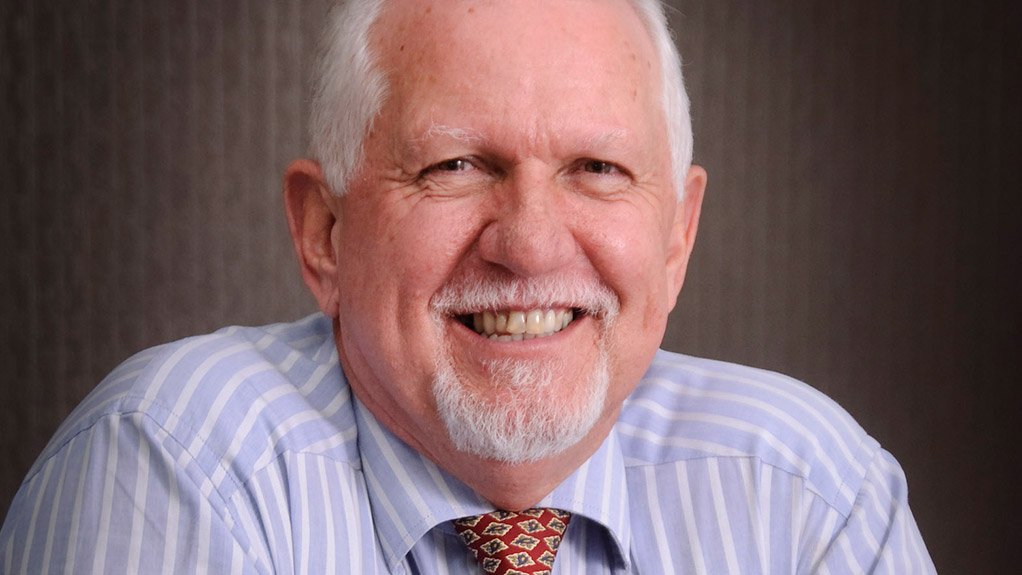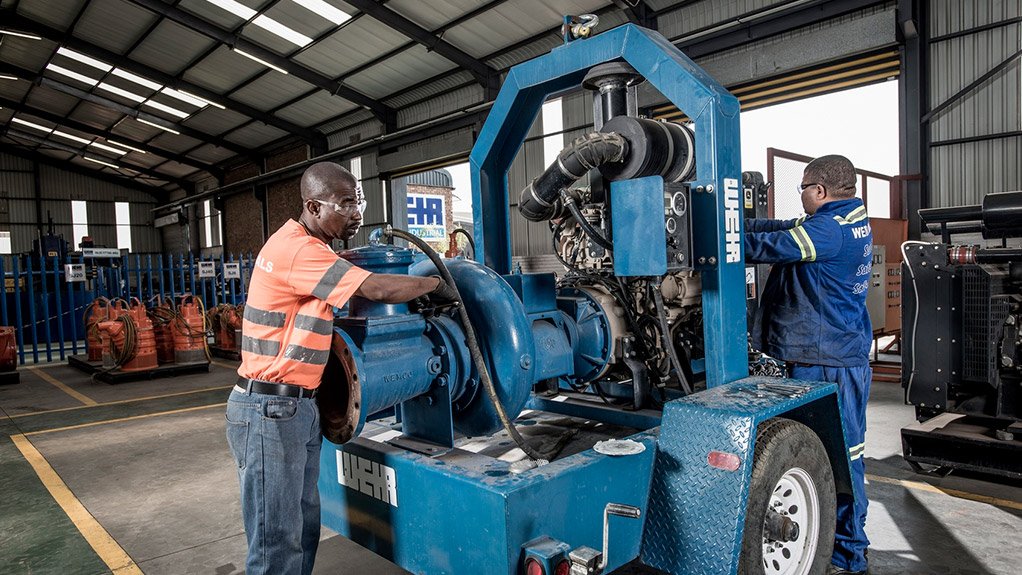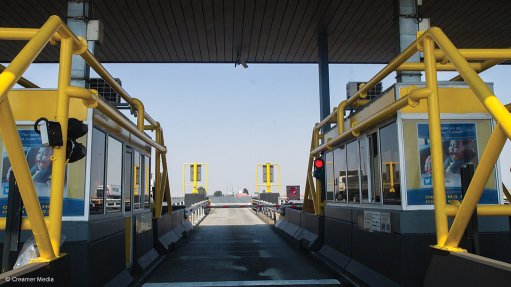Pump trends based on increasing operational efficiencies



HOWARD JONES Current trends in the pumps industry are aimed at improving oprational efficiency
TRAILER MOUNTED PUMPS Weir Minerals Africa's trailer mounted range has been used in municipal initiatives to upgrade water and wastewater pumping stations
It is not anticipated that the design of pumps will change drastically any time soon, as most modifications or adaptations will either improve operational efficiencies or be introduced specifically for an application, says pumps manufacturer Weir Minerals Africa dewatering product manager Howard Jones.
“There will be new developments in terms of materials, such as new corrosion- resistant alloys or improved wear-resistant rubber linings. Pump specifications will change too, based on the application, which might require, for example, high heads and larger impellers, but, ultimately, pumping principles stay the same,” he comments.
Jones points out that one of the current trends aimed at improving operational efficiency is the implementation of mechatronics engineering, which includes predictive performance and maintenance tools, health and safety concerns, and the centralisation of processes in the mining and industrial sectors.
“One such predictive maintenance tool is Weir’s Synertrex system which uses advanced sensing technology to monitor the performance of our equipment,” says Jones. The product is currently being deployed at a platinum mine in South Africa, where it has been set up to monitor parameters on cyclones, valves, slurry pumps and screens. Mechatronics engineering refers to the design of computer-controlled electromechanical systems and, while the end-product – in this case a pump – is essentially mechanical in nature, the electrical and computer systems are critical to its operation. Jones notes that, in terms of pumps, mechatronics is generally used to allow for remote monitoring and maintenance.
He points out that the ability to monitor a pump’s operation remotely is important to many clients, as they do not have to be on site to ensure its functioning, which saves time and travel expenses. Remote monitoring systems can detect mechanical problems and provide updates for clients accordingly, enabling them to schedule preventive maintenance or pre-emptively shut the pump off if necessary, he explains.
Mechatronics is also essential in creating automated systems. “Nowadays, people desire ease of use, reliability, predictive maintenance and automated equipment, which, once implemented, require minimal human input or interaction,” Jones adds.
Meanwhile, as a result of the global drive towards optimising efficiency, mining and industrial sectors have started to push for the centralisation of processes, which is also beneficial to customers in terms of reducing their operational costs.
He also notes that, from a customer standpoint, there is more emphasis on compliance with international standards, which is partially prompted by the increased focus on the health and safety of employees.
Jones notes that companies are morally and legally obligated to ensure the wellbeing of their employee and require assurance that the equipment they are using is not defective. “Products that are internationally certified have been subjected to rigorous testing and are thus proven to be of a high quality, and are less likely to fail. Weir Minerals is particularly focused on product stewardship and ensuring that our customers have access to high-quality, reliable products that can be operated safely. Many of the product developments are specifically focused on improving ease of maintenance.”
Multiflo Dewatering Range
Weir Minerals strives to incorporate all the aforementioned trends when designing pumping solutions, such as the Multiflo dewatering range – an internationally certified pump range that is suitable for multiple slurry and dewatering applications.
The range includes self-priming diesel- driven pumps, electrically driven pumps designed for heavy-duty dewatering applications, pure dewatering pumps, submersible dirty-water pumps, as well as heavy-duty slurry submersible pumps, which are often used in openpit or slime dam dewatering solutions. These can be pontoon trailer- and skid-mounted in accordance with the client’s requirements.
Traditionally, civil construction of a pumpstation would be necessary for the these applications. The introduction of Multiflo pontoon- or skid-mounted pumps has reduced costs for Weir customers, as there is minimal civil work and they can easily be transported to other locations.
Multiflo pontoons, which are locally manufactured by Weir Minerals in Gauteng, are constructed with access walkways, which are either fixed to the bank or floating. The walkway holds the cable and piping from the docking station to the shore and provides ready access to the pumps for inspection or regular maintenance. Another benefit is the constant suction conditions presented to the pump owing to the pontoon being dynamic in the differing water levels whilst pumping.
Weir Minerals uses a variety of construction materials, including complete steel pontoon barges and linear low-density polyethylene flotation devices with steel frames for lighter applications, where mobility from one pond to another is required. These solutions can handle most pump offerings with a load-bearing capacity from 500 kg to 10 t, including the structure. The steel-hull heavy-duty pontoons can have a total mass of up to 30 t.
Jones notes that a client approves the engineered-to-order pontoon solution before it is partially disassembled and then transported to site either by truck or shipping container, depending on the size of the solution and the distance to site.
Weir Minerals provides assembly instructions and supporting documentation, with a Weir Minerals technician supervising installation on site.
He concludes that a few municipal clients have rented the company’s trailer-mounted pumps for use at infrastructure projects in an ongoing effort to upgrade their water and wastewater pumping stations, “though the entire range is especially popular in mineral sands mining, which is somewhat transient, compared with other mining operations”.
Article Enquiry
Email Article
Save Article
Feedback
To advertise email advertising@creamermedia.co.za or click here
Announcements
What's On
Subscribe to improve your user experience...
Option 1 (equivalent of R125 a month):
Receive a weekly copy of Creamer Media's Engineering News & Mining Weekly magazine
(print copy for those in South Africa and e-magazine for those outside of South Africa)
Receive daily email newsletters
Access to full search results
Access archive of magazine back copies
Access to Projects in Progress
Access to ONE Research Report of your choice in PDF format
Option 2 (equivalent of R375 a month):
All benefits from Option 1
PLUS
Access to Creamer Media's Research Channel Africa for ALL Research Reports, in PDF format, on various industrial and mining sectors
including Electricity; Water; Energy Transition; Hydrogen; Roads, Rail and Ports; Coal; Gold; Platinum; Battery Metals; etc.
Already a subscriber?
Forgotten your password?
Receive weekly copy of Creamer Media's Engineering News & Mining Weekly magazine (print copy for those in South Africa and e-magazine for those outside of South Africa)
➕
Recieve daily email newsletters
➕
Access to full search results
➕
Access archive of magazine back copies
➕
Access to Projects in Progress
➕
Access to ONE Research Report of your choice in PDF format
RESEARCH CHANNEL AFRICA
R4500 (equivalent of R375 a month)
SUBSCRIBEAll benefits from Option 1
➕
Access to Creamer Media's Research Channel Africa for ALL Research Reports on various industrial and mining sectors, in PDF format, including on:
Electricity
➕
Water
➕
Energy Transition
➕
Hydrogen
➕
Roads, Rail and Ports
➕
Coal
➕
Gold
➕
Platinum
➕
Battery Metals
➕
etc.
Receive all benefits from Option 1 or Option 2 delivered to numerous people at your company
➕
Multiple User names and Passwords for simultaneous log-ins
➕
Intranet integration access to all in your organisation




















